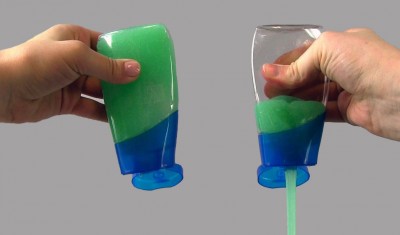
Soon, the days of squeezing out the final drops of glue to finish piecing together that project will be over, thanks to slippery coating manufacturer, LiquiGlide. The company took its first step on March 24, announcing their partnership with glue company Elmer’s Products, Inc.
Based in Cambridge, LiquiGlide is the first company to create a liquid-impregnated surface coating. The Varanasi Research Group laboratory at the Massachusetts Institute of Technology developed this technology that makes the inside of bottles permanently wet, allowing viscous fluids such as glue and mayonnaise to pour out easily. James Bird, assistant professor of mechanical engineering at Boston University’s College of Engineering, worked with the Varanasi Group when LiquiGlide was coming together.
“A highly textured surface is lubricated with an immiscible liquid, such as oil, so that the material in the contain slides rather than sticks to the wall,” Bird said. “The lubricating liquid itself is not sheared off the wall due to a combination of small-scale texture in the solid and capillary forces.”
In the case of both closed and open systems, the viscous liquid product sits directly on a permanently wet, liquid-impregnated surface, causing the product to slide on the multi-layer surface that is liquid to the touch. The layer doesn’t need to be reapplied onto the structure that contains the product. Instead, the lubricating layer sticks onto the contain wall but moves enough with the liquid product to allow the liquid product to flow out easily and then it circulates back to stay close to the product.
“If you have some sheer from the glue that you are squeezing out, that sheer is going to be applied onto the surface itself,” Bird said. “Here, you have a lubricating fluid that in some sense can slip along with the liquid as opposed to being stuck onto the wall. Without any physical substrate or porous surface, the lubricating fluid will also drain out. But if you have surface forces that will keep the lubricating fluid close to the wall, so it will still move but then recirculate back into that porous structure, it gives a chance to be less concerned [about losing the effect].”
The exclusivity of the Elmer’s deal now gives them a chance to see the technology put to practice, but the LiquiGlide and Elmer’s partnership goes beyond the consumer experience. Their joining forces will also have environmental effects on both the consumer and manufacturer ends, said LiquiGlide’s CEO and co-founder J. David Smith.
“Each year, millions of tons of wasted viscous products are thrown away because consumers can’t get the contents out of the packaging,” he said. “We help them eliminate waste by allowing products to completely and easily evacuate from packaging. This also makes packaging easier to recycle by removing the need to rinse the package prior to disposal. Also, our coatings enable consumer packaged goods manufacturers to create higher concentrated formulations and package them in smaller containers, reducing material costs and shipping costs.”
With customizable coatings made from U.S. Food and Drug Administration-approved materials, LiquiGlide can eliminate the need to smack the nearly empty bottle to savor the last bit of ketchup and allow oil to slide out easily and completely.
“I think it will really help oil pumps, if it gets that advanced, and glue containers,” said Shana Hedvat, a sophomore in the Sargent College of Health and Rehabilitation Sciences. “However, I’m a little skeptical on using it in my food. I still don’t know if I want to add something to what I’m eating just to help it come out of the container. It might change the way my food tastes and might also cause unknown effects.”
Because LiquiGlide’s slippery coating technology can be altered depending on the viscous liquid’s reluctance to mix with the lubricating liquid coating, LiquiGlide can impact industries ranging from consumer products to industrial goods. The far-reaching potential applications for their patented and customized coatings have them excited for the future, one in which their coatings help to reduce waste and enhance efficiency.
“In the next five years, LiquiGlide will have an impact on industries across the board, eliminating waste for manufacturers and customers and enabling innovative uses of viscous liquids,” Smith said. “What the wheel was to transportation, we believe LiquiGlide is to liquids. It changes how liquids move.”




nice work